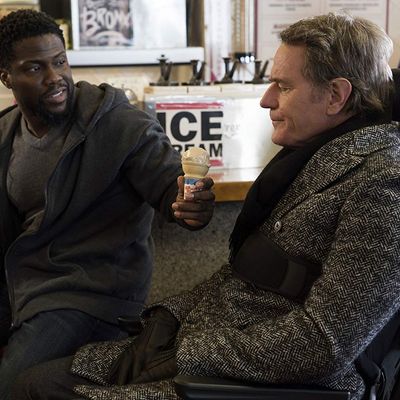
The Upside is the kind of movie whose greatest virtue is that it’s not as bad as it could be — and in this case, what sounds like a backhanded compliment is actually quite a feat. It’s the third filmed adaptation of the story of quadriplegic French billionaire Philippe Pozzo di Borgo and his caregiver Abdel Sellou; the first was the 2012 runaway French hit The Intouchables. The story is little more than the latest spin on the Driving Miss Daisy formula: uptight rich person finds new meaning in life via the life-giving powers of a lower-class minority member who is contractually obligated to work for them. These stories, and the reassurances they are meant to give their audience, are inherently limited in the scope of their message-delivery. The privileged, nonminority viewer is meant to realize that their caregiver/gardener/mailman/bodega cashier has something to offer them, while the working-class viewer is meant to realize what? That they have something to offer a rich person? Not just their labor, but their soul and love, as well?
This is a long-winded preamble to say there is a ceiling — and a rather low one, at that — to how good something like The Upside can be. This isn’t just because of its subject matter and perspective issues, but because it’s opting in to the “message movie” game with such glaring subject matter and perspective issues. The range that it has to work with, then, is the humanity of its characters — how willing it is to let them live outside the message they are there to convey. And for what it’s worth, director Neil Burger and writer Jon Hartmere allow for quite a bit. It’s just not quite enough to overcome that packaging.
In this New York–set version of the original story, the billionaire is Phillip (Bryan Cranston), and the ex-con who unintentionally winds up in his employ is Dell (Kevin Hart). After a flash-forward prologue that adds nothing other than an acknowledgement that a “later” exists (a tic that’s becoming all too common in movies, and an easy way to feign narrative complexity) the film begins with Phillip looking for a new life auxiliary. The job, as we soon find out, is not just that of a caregiver, but a sort of substitute body, making sure each limb is accounted for, the employed lifting the employer in and out of bed and being at his side at a moment’s notice if he should have any kind of emergency in the night. Films as disparate as The Clouds of Sils Maria and Set It Up have explored the modern alienation of the personal assistant; this takes the idea of the colonization of another body to another level entirely.
But it allows for a level of intimacy and discomfort that might not otherwise be reached. Dell takes the job, and the going is rocky at first, and Phillip’s assistant Yvonne (Nicole Kidman) is on his case as taskmaster. But the necessary closeness of their bodies becomes a bridge of sorts to understanding between these two men from very different walks of life. Hackier stories have tried to bridge those differences with mere servitude or sex, but the sight of Cranston being lifted like a rag doll by Hart into the shower begs more questions about privilege — the degree of Phillip’s physical limitations and the extreme body-and-soul ask of Dell’s job are intertwined. Phillip says he likes Dell because he’s the only person who doesn’t look at him with pity — Dell is too gobsmacked by his new employer’s opulent penthouse to even consider feeling sorry for the wheelchair-bound Phillip. “Your plantation is bananas,” Hart spits, then swipes a first edition of The Adventures of Huckleberry Finn from Phillip’s collection of first editions.
The two become friends, of course, in the prince-and-pauper way one might expect them to. Phillip teaches Dell about fine art and opera, Dell gets Phillip high and takes him to Gray’s Papaya. None of this is ever as interesting as the physical reality of their relationship, nor the very unphysical nature of Phillip’s other romance, an epistolary relationship with a woman he’s never met. This quickly becomes another way for the black man to fix the white man’s soul: Help the widower seize the day and find love again by initiating a face-to-face meeting.
The way that meeting goes is not the way similarly pitched rom-coms might have prepared you for, and it again speaks to something that’s hard to sum up with a cute tagline about odd couples. The whole film seems geared to an idea that Dell’s poverty and bawdy sense of humor and lack of opera literacy is more true, that his body physically contains something that Phillip’s is missing, that can bring him “back to life.” But the epistolary side plot acknowledges the worlds one might inhabit with or without a body, and the value of what can’t be touched or held or danced with. It’s worth its own movie, but is quickly breezed by en route to the film’s emotional-button-pushing finale. That, more or less, is The Upside in a nutshell. It’s a film that contains complicated, sad, interesting ideas rarely expressed onscreen — even Kidman’s scold character unfolds into a more intriguing person, full of contradictions — but whose package is fundamentally unsuited to showcase those ideas, like a sweater with the holes in all the wrong places.

